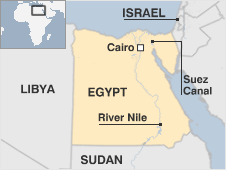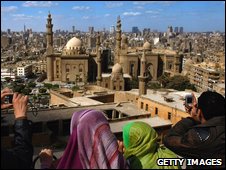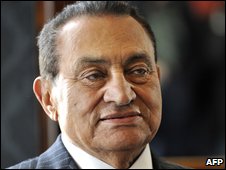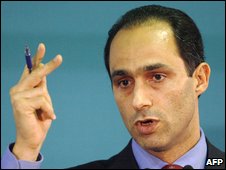Generic Medicines
Taj Pharma is the largest generic pharmaceutical company in India. We hold top positions in different established markets worldwide generics markets..
While best known for its pyramids and ancient civilisations, Egypt has played a central role in Middle East politics in modern times.
 |
Its three wars with Israel in 1948, 1967 and 1973, then its eventual peace with its adversary in 1979, have seen Egypt move from being a warring nation to become a key representative in the peace process.
Egypt's ancient past and the fact that it was one of the first Middle Eastern countries to open up to the West following Napoleon's invasion means that it is seen by many as the intellectual and cultural leader in the region. The head of Cairo's Al-Azhar Mosque is one of the highest authorities in Sunni Islam.
AT A GLANCE
 Politics: President Hosni Mubarak has been in power since 1981; his strongest challenger is the Muslim Brotherhood which is tolerated but officially banned
Economy: The Egyptian economy is the second largest in the Arab world after Saudi Arabia
International: Egypt has played a key role in efforts to resolve the Middle East conflict; its prestige as a broker is said to have suffered after its indecisive response to the 2006 war between Israel and Hezbollah in Lebanon
|
But the historic step by President Anwar Sadat to make peace with Israel in the 1979 Camp David agreement led to Egypt being expelled from the Arab League until 1989, and in 1981 Mr Sadat was assassinated by Islamic extremists angry at his moves to clamp down on their activities.
Since then, President Hosni Mubarak has taken a more moderate line, but Islamic groups have continued their campaigns sporadically, being responsible for deadly attacks that have often targeted tourists and resort areas.
Campaigners for political reform have become more vocal in recent times and have taken to the streets in defiance of an emergency law, in force since 1981. Activists say the law restricts political expression.
Although Egypt has changed its constitution to allow the opposition to contest presidential polls, potential candidates must meet strict criteria for participation. A ban remains on religious political parties.
Egypt's teeming cities - and almost all agricultural activity - are concentrated along the banks of the Nile, and on the river's delta. Deserts occupy most of the country.
The economy depends heavily on agriculture, tourism and cash remittances from Egyptians working abroad, mainly in Saudi Arabia and the Gulf countries.
However, rapid population growth and the limited amount of arable land is straining the country's resources and economy.
President: Muhammad Hosni Mubarak
Hosni Mubarak is Egypt's longest-serving ruler since Muhammad Ali in the early 19th century and one of the longest-serving leaders in the Arab world.

President Mubarak has pursued economic, but not political reform
|
Aged 77, he gained a fifth consecutive term in presidential elections in September 2005. The poll was the first under a new system which allows multiple candidates to stand. In previous elections Egyptians voted yes or no for a single candidate appointed by parliament.
However, the only opposition organisation which has broad public support, the Muslim Brotherhood, is banned from open political activity and could not field a candidate.
Mr Mubarak succeeded Anwar Sadat, who was assassinated in 1981. He is seen as Egyptian politics' great survivor, having escaped no fewer than six assassination attempts.
The president is an economic liberal and his government has promised economic reforms. But Egypt remains plagued by high unemployment and low standards of living.
Mr Mubarak has pursued friendly relations with the West, breaking the isolation imposed on Egypt by Arab countries opposed to peace with Israel.

Gamal Mubarak is widely tipped to be the next president
|
As a military man he modernised the air force after Egypt's defeat in the six-day war with Israel in 1967. He helped to plan the 1973 Yom Kippur War - an Egyptian-Syrian attack on Israeli forces on the Suez Canal and in the Golan Heights.
The succession has been hotly debated. Reports that Mr Mubarak's younger son Gamal is being groomed for office have angered the opposition and have been denied by the president.
Since 1952, when army officers led by Gamal Abdel Nasser overthrew the monarchy, Egyptian leaders have been drawn from the military.
Hosni Mubarak was born in 1928. He and his wife Suzanne, who is part Welsh and part Egyptian, have two sons, Ala and Gamal.
Egypt is a major regional media player. Its press is one of the most influential and widely-read in the region, and its TV and film industry supplies much of the Arab-speaking world with shows from its Media Production City, an enterprise which was set up to create the "Hollywood of the East".
Media criticism of the government is commonplace, but press laws which allow prison sentences for libelling the president, state institutions and foreign heads of state remain in place.
There are two state-run national TV channels and six regional channels, but many viewers turn to pan-Arab channels for their news. Egypt is a big force in satellite TV; its Space Channels are popular across the Arabic-speaking world. Broadcasters can tap into a major programme-making industry and have access to a large film archive.
Egypt was the first Arab nation to have its own satellite, Nilesat 101. Private satellite TV stations include Dream 1, Dream 2 and Al-Mihwar TV. The state's radio monopoly was broken with the arrival of private, commercial music stations in 2003.
Six million Egyptians were online by 2007 (InternetWorldStats.com). Bloggers have made their presence felt, some of them emerging as a force of political opposition.
Media freedom body Reporters Without Borders added Egypt to its list of "internet enemies" in 2006 over the arrests of bloggers during pro-democracy demonstrations.
The press
Television
Radio
News agency
Middle East News Agency - state-run
AFRICA | ASIA-PACIFIC | AMERICAS | EUROPE | MIDDLEEAST | SOUTHASIA
![]()
![]()
![]()
Mauritania Mauritius Morocco Mozambique Namibia Niger Nigeria Republic-of-congo Rwanda Sao-tome-and-principe Senegal Seychelles Sierra-leone Somalia South-africa Sudan Swaziland Tanzania The-gambia Togo Tunisia Uganda Australia Brunei Burma Cambodia China East-timor Fiji Indonesia Japan Kazakhstan Kiribati Kyrgyzstan Laos Malaysia Marshall-islands Micronesia Mongolia Nauru New-zealand North-korea Palau Papua-new-guinea Samoa Singapore Solomon-islands South-korea Taiwan Tajikistan Thailand The-philippines Tonga Turkmenistan Tuvalu Uzbekistan Vanuatu Vietnam Antigua-and-barbuda Belize Bolivia Brazil Canada Chile Colombia Costa-rica Cuba Dominica Dominican-republic Ecuador El-salvador Grenada Guatemala Guyana Haiti Honduras Jamaica Mexico Nicaragua St-kitts-and-nevis St-lucia Suriname Trinidad-and-tobago Uruguay Venezuela Albania Andorra Armenia Austria Azerbaijan Belarus Belgium Bosnia-hercegovina Bulgaria Croatia Cyprus Czech-republic Denmark Estonia Finland France Georgia Germany Greece Hungary Iceland Ireland Italy Latvia Liechtenstein Lithuania Luxembourg Macedonia Malta Moldova Monaco Montenegro Norway Poland Portugal Russia San-marino Serbia Slovakia Slovenia Spain Sweden Algeria Egypt Iran Iraq Israel-and-palestinian-territories Jordan Kuwait Lebanon Libya Mauritania Oman Saudi-arabia Sudan Syria Tunisia United-arab-emirates Yemen Afghanistan Bangladesh Bhutan India Nepal Pakistan Sri-Lanka The-Maldive